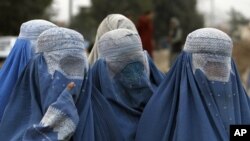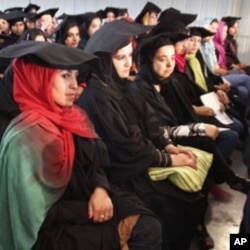Two leading international aid agencies say women's rights in Afghanistan are under threat as international troops prepare to leave the war-torn country.
Reversible gains
In separate reports released Monday, British-based Oxfam and ActionAid noted improvements in Afghan women's rights since 2001 U.S.-led invasion, but said such gains were fragile and reversible.
Under Taliban rule in the 1990s, women in Afghanistan were not allowed to go to work, get an education, or leave the house without being escorted by a man.
Oxfam says that some 2.7 million girls are now enrolled in school, compared to a few thousand during Taliban rule.
Taliban
But the aid group says such gains in women's rights could be lost in a "quick bargain for peace." The co-author of Oxfam's report, Louise Hancock, said Monday that Afghan women do not feel they can count on those involved in the Taliban reconciliation process to safeguard their rights.
|
Listen to VOA's Ira Mellman interview with one of those responsible for the ActionAid study, Anjali Kwatra |
ActionAid also called for women to play a role in any political settlement to the 10-year war.
The agency's survey of 1,000 Afghan women found that the vast majority worry about the Taliban returning to power. More than a third of those polled say Afghanistan will be worse off if foreign troops leave.
All international combat troops are set to leave Afghanistan by the end of 2014.
Violence
Oxfam notes that despite gains in recent years, Afghan women face a number of challenges. The aid agency says a law criminalizing practices such as honor killings and child marriages is only being enforced in 10 out of Afghanistan's 34 provinces. In the second quarter of 2011 alone, the Afghan Independent Human Rights Commission registered more than 1,000 cases of violence against women.
Oxfam also says the number of women in the civil service has dropped from more than 30 percent of the workforce in 2006 to around 18 percent last year.









